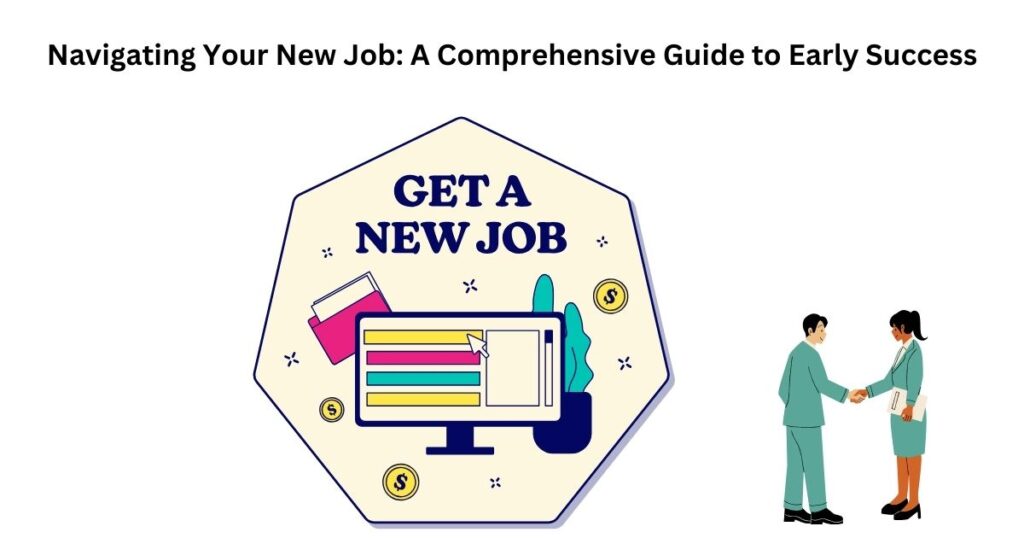- Home
- About Us
- Services
- IT, Digital & technologies
- Non- IT
- Staffing Service
- - Executive Search
- - Project Based Hiring
- - Direct Hire
- - Contract Hiring
- Contingent Staffing
- Outsourcing
- PF ESI Management
- Salary TDS Management
- Labour Compliance Outsourcing
- Compliance Management
Workforce Solution
Payroll & Compliance Management
BGV (Background Verification)
- Solution
- Blog
- Career Zone
- Contact Us
Navigating Your New Job: A Comprehensive Guide to Early Success

Navigating Your New Job: A Comprehensive Guide to Early Success
Embarking on a new job is both exciting and challenging. The initial days set the tone for your journey ahead, and making a positive impression is crucial. This guide offers practical advice to help you navigate your new role effectively, ensuring a smooth transition and laying the foundation for long-term success.
Before Your First Day
Preparation is key to easing first-day jitters and setting yourself up for success.
1. Confirm Logistics
Ensure you have clarity on your start date, reporting time, dress code, and work location. If you’re working remotely, verify the technical requirements and ensure you have the necessary equipment. According to Coursera, managing these details can help lessen anxiety about your first day.
2. Plan Your Commute
If you’re commuting, familiarize yourself with the route, considering traffic patterns or public transportation schedules. A trial run can help you gauge the time needed and reduce first-day stress.
3. Prepare Necessary Documents
Gather all required documents, such as identification, tax forms, and bank details, to ensure a seamless onboarding process.
4. Set Personal Goals
Reflect on what you aim to achieve in your new role. Coursera suggests preparing a 30-60-90 day plan to outline your objectives and track your progress.
The First Week: Building a Strong Foundation
The initial week is pivotal in understanding your role, team dynamics, and organizational culture.
1. Introduce Yourself
Take the initiative to introduce yourself to colleagues. A friendly demeanor fosters positive relationships and demonstrates your enthusiasm. As Atlassian notes, building relationships early can set the stage for effective collaboration.
2. Understand Expectations
Schedule a meeting with your manager to discuss your responsibilities, performance metrics, and immediate priorities. Clarifying expectations ensures alignment and showcases your proactive attitude. Indeed emphasizes the importance of understanding your manager’s expectations to set yourself up for success.
3. Observe and Adapt to Company Culture
Pay attention to workplace norms, communication styles, and team interactions. Adapting to the company culture demonstrates your flexibility and willingness to integrate. Coursera highlights the importance of observing and understanding company culture to navigate your new environment effectively.
4. Take Notes
Document important information, such as processes, tools, and key contacts. Having a reference helps in retaining details and reduces the need to ask repetitive questions. Coursera recommends requesting and using resources to help absorb essential information.
5. Clarify Communication Channels
Understand the preferred methods of communication within your team, whether it’s email, instant messaging, or regular meetings. Effective communication is vital for seamless collaboration. Atlassian suggests clarifying communication preferences to ensure smooth interactions.
The First Month: Demonstrating Competence and Initiative
As you settle in, focus on showcasing your skills and contributing meaningfully.
1. Seek Feedback
Regularly ask for feedback to understand areas of strength and opportunities for improvement. This openness reflects your commitment to growth and excellence. Indeed advises seeking feedback to help you adjust and excel in your new role.
2. Engage in Team Activities
Participate in meetings, collaborative projects, and social events. Active involvement demonstrates your team spirit and helps build rapport with colleagues. Atlassian emphasizes the importance of engaging in team activities to foster strong working relationships.
3. Identify Quick Wins
Look for opportunities to apply your skills to projects that offer immediate value. Achieving early successes boosts your confidence and establishes credibility. Coursera suggests focusing on early achievements to build momentum in your new role.
4. Learn the Tools and Systems
Familiarize yourself with the software and tools essential for your role. Proficiency in these systems enhances your efficiency and effectiveness. Coursera recommends reviewing the tools at hand to ensure you can perform your tasks effectively.
5. Understand Organizational Structure
Gain insight into the company’s hierarchy and key stakeholders. This knowledge aids in effective communication and decision-making. Coursera highlights the importance of understanding the organization structure to navigate your new workplace successfully.
The First 90 Days: Solidifying Your Role
As you progress, aim to establish yourself as a valuable team member and plan for future contributions.
1. Set Long-Term Goals
Collaborate with your manager to define objectives aligning with the company’s mission and your career aspirations. Clear goals provide direction and purpose. Indeed emphasizes the importance of setting goals to guide your progress and development.
2. Expand Your Network
Build relationships beyond your immediate team. Understanding different departments fosters collaboration and offers a holistic view of the organization. Atlassian suggests expanding your network to gain diverse perspectives and insights.
3. Seek Professional Development
Identify training sessions, workshops, or courses that enhance your skills. Continuous learning demonstrates ambition and dedication to your role. Coursera recommends prioritizing learning to support your ongoing success.
4. Reflect on Your Progress
Regularly assess your achievements and areas for growth. Self-reflection fosters continuous improvement and prepares you for performance evaluations. Indeed advises reflecting on your progress to ensure you’re meeting your goals and expectations.
5. Communicate Achievements
Share your successes with your manager and team. Transparent

